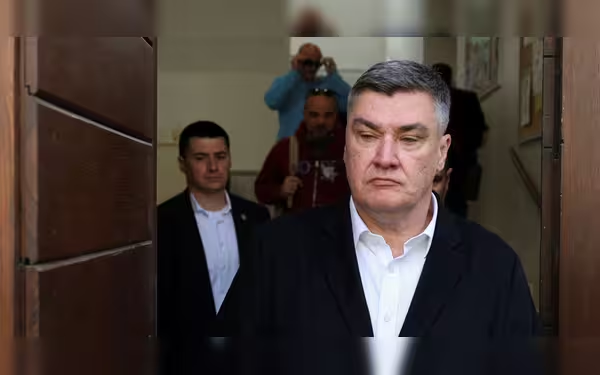Thursday, July 4, 2024 06:13 PM
Croatia's President Barred from Leading New Government
- Constitutional Court rules president cannot lead new government due to campaign rules
- Ruling conservative HDZ party secures most seats but falls short of majority
- President Milanovic challenges Prime Minister Plenkovic in recent parliamentary election
 Image Credits: Le Monde
Image Credits: Le MondeCroatia's Constitutional Court rules President Milanovic cannot lead new government after parliamentary election. HDZ party secures most seats but lacks majority. Challenges include corruption, labor shortages, and undocumented migration.
Croatia's top court has ruled that the country's president, who aimed to become prime minister following the recent parliamentary election, cannot lead the new government. The Constitutional Court emphasized that the president had been informed in advance that participation in the campaign required resignation beforehand. Constitutional Court President Miroslav Separovic stated firmly that adherence to the constitution and the law is mandatory for all.
In the parliamentary election held on Wednesday, the ruling conservative HDZ party secured the most seats but fell short of a majority to form a government independently. The election witnessed a fierce battle between conservative Prime Minister Andrej Plenkovic and left-wing populist President Zoran Milanovic, with the latter unexpectedly challenging Plenkovic in mid-March.
Despite the Constitutional Court's warning that Milanovic could only run for election if he stepped down as president, he proceeded with his campaign, accusing Plenkovic of leading a corrupt government. The HDZ won 61 seats, the Social Democrats (SDP) secured 42 seats, and the nationalist right-wing Homeland Movement party obtained 14 seats, positioning itself as a potential key player in forming a new government.
Both the HDZ and SDP are now working to establish a parliamentary majority, with Plenkovic expressing confidence in forming one soon. However, the SDP faces a more challenging task in this regard. In Croatia, the president nominates a prime minister-designate, who must then receive the backing of a majority of MPs before being voted on by the full parliament.
The parliamentary elections took place against the backdrop of Croatia grappling with issues such as corruption, labor shortages, high inflation rates, and undocumented migration, reflecting the complex challenges facing the nation.













